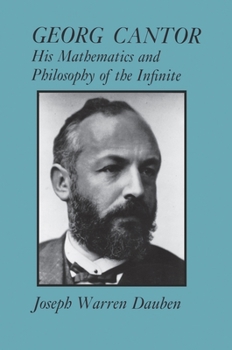Georg Cantor: His Mathematics and Philosophy of the Infinite
Select Format
Select Condition 
Book Overview
One of the greatest revolutions in mathematics occurred when Georg Cantor (1845-1918) promulgated his theory of transfinite sets. This revolution is the subject of Joseph Dauben's important studythe most thorough yet writtenof the philosopher and mathematician who was once called a "corrupter of youth" for an innovation that is now a vital component of elementary school curricula.
Format:Paperback
Language:English
ISBN:0691024472
ISBN13:9780691024479
Release Date:September 1990
Publisher:Princeton University Press
Length:424 Pages
Weight:1.35 lbs.
Dimensions:1.2" x 6.1" x 9.2"
Customer Reviews
3 ratings
Cantor, A Top Mathematician Who Unifies God and Sciene
Published by Thriftbooks.com User , 19 years ago
This is a great book on the work of Georg Cantor. The new millennium brought forth a new human hope -- to unify `that which is physical' with `that which is spiritual.' This hope would unify the fields of science and theology. Currently, these fields are separated by their different beliefs and methods of truth seeking. On beliefs, many scientists do not believe in God whereas all theologians believe in God. On truths, scientists use the scientific method to express true scientific statements whereas theologians use feelings, phenomena, and scriptures to express true theological statements. I believe that all `big discoveries' unify 'that which is physical' with 'that which is spiritual.' For instance, the big discovery of Nicholas of Cusa unifies an infinite God and our finite universe. And, the big discovery of Leibniz unifies spiritual atoms with all physical things in the universe. Further, the big 1920 discovery of symbolic languages allows us to speak about God and the universe using the same symbolic language. In this book on Cantor, one earns that the mathematics and infinities of Georg Cantor is another `big discovery' that unifies God and the universe. Cantor's theory of the infinity reveals two infinities. One is the `non-genuine' infinite. This infinity is incomplete. It applies to variable magnitudes in the universe, as they either grow beyond all limits or diminishes to an arbitrary smallness. This infinity always remains finite. Cantor's transfinite numbers orders and counts all non-genuine infinities. On the other hand, the `genuine' infinity is determinate, unchanging, and complete. It is found in the complex variables used by scientists. There, the determinate infinity is the single point at infinity. Complex variables in the neighborhood of this single point are thus analytical. The genuine infinity is also used by theologians to represent God. It is obvious that organized research on these big discoveries must be increased considerably by all nations. To start organizing this research effort, I am writing a book on symbolic languages and the big discoveries of Cusa, Leibniz, and Cantor.
Philosophy that can be mathematically proven
Published by Thriftbooks.com User , 20 years ago
Some areas of mathematics can be described as philosophy that can be proven, and that certainly applies to the transfinite arithmetic created by Georg Cantor. When his results were first published, they were met with a great deal of opposition by many established and influential mathematicians. Considering the revolutionary aspects of his work, the fact that there was opposition was not surprising and indeed necessary for mathematics to properly advance. However, the opposition to Cantor's main results was so strong that the story that it drove him mad has become a part of the mathematical folklore. As Dauben is careful to point out, his research indicates that Cantor would have suffered from the bouts of depression independent of the degree of opposition to his work and most likely independent of what kind of work he did. In fact, Cantor himself is quoted as stating that his time spent in institutions was some of the most restful and productive of his life. Cantor was in fact a very strong personality, he stood up well against the opposition and ultimately was proven to be correct. Dauben not only explains the sources of that strength, from his supportive, yet not domineering father to his wife and children. His religious beliefs were also very strong, to the point where he firmly believed that his work was part of God's structure of the universe and he was nothing more than a messenger. However, it is the mathematics that really matters and Dauben does an excellent job in describing the essence of Cantor's discoveries. These are complex topics, and yet he does a good job in explaining the fundamentals of the mathematics and why it was so difficult for other mathematicians to accept. This is the best description of Cantor's work at a general level that I have ever read.Published in Journal of Recreational Mathematics, reprinted with permission.
Hard core and worth it
Published by Thriftbooks.com User , 20 years ago
I found this was an excellent memoir of Cantor and his ideas. It goes far more deeply into the mathematics than other discussions of Cantor, and makes you want to read more about both set theory and about the development of topology in the early twentieth century. It also attempts to place Cantor's philosophy and mathematical ideas into a psychological context as well, which is probably appropriate - even essential - in the case of Cantor. Though, in twenty years, this aspect of the book may not wear well. All in all, it is a refreshingly strong and insightful treatment of one of the major historical figures in nineteenth century mathematics.






